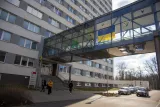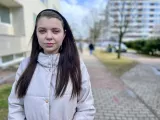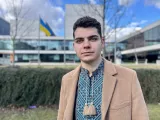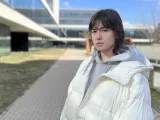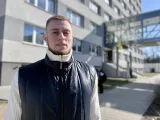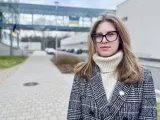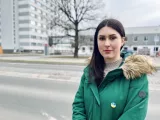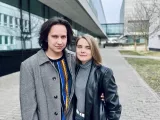Published: 24.06.2022
It was Thursday, 24 February. They woke up to a day that was supposed to be like any other. A student day. Lectures, seminars and nice meetings with friends on campus awaited them. But that morning they woke up to war. A war they didn't want. Dozens of Ukrainian students, but also Russian ones, together with Czech ones, agree on one thing. This is not a war between Russians and Ukrainians. It is Vladimir Putin's war.
Most students found out about the start of the Russian invasion of Ukraine as soon as they picked up the phone in the morning. "Suddenly I received a large number of text messages. My mother texted me that the war had started," Viktoriia Safonenko, a Ukrainian student at the Faculty of Economics and Administration, described the initial shock. Other students received messages with detailed descriptions of what was happening in their home country. Relatives wrote to them that the Russian army was bombing Kiev and Kharkiv. "It has already started!!! We have not slept since five in the morning. You can hear explosions," read the terrifying message sent by her family in Kiev to Alona Podzega, who is finishing her studies at the same faculty and also works for the University of Pardubice.
"In February, everyone said there might be a war. But I didn't believe it. We live in the 21st century, I don't understand that these things can happen in this time," says Daria Smirnova, a Ukrainian student studying at the Faculty of Arts and Philosophy, who has bad memories of the 2014 conflict. "Soldiers came to the school with machine guns and told us to go home. I ran to meet my grandmother, crying and calling out to her that there was a war. We moved from Luhansk to Odessa because of this. And here it is again. I didn't think I would experience two wars in 20 years of my life," she sighed. Yet Thursday, 24 February, was written in black in the history of Ukraine and Europe.
Life at the University of Pardubice seems to have stopped for them for a while. The lectures went by the wayside that day, and the studies were drowned out by the war. The motivation to gather new knowledge was replaced by sadness, fear and anger. "Even if I had gone to the lecture, I would not have been able to concentrate at all. I kept thinking about whether my family was okay," says Roman Pokhodoshchuk, a student of the Faculty of Transport Engineering, who was fighting a very hard battle within himself. On the very Thursday, he wanted to pack up and go home to join the fighting and defend his country. But his family tried to convince him not to go. "I should stay in the Czech Republic so I can help other Ukrainians who decide to come here," the young man said, adding that many of his classmates from his former school are already on the front lines. Almost all of the students wanted to go home. "Every day is very hard for me, I would like to be with my family, I am very worried about them," Viktoriia said, adding that her dad is ready to defend Ukraine. "He makes Molotov cocktails at home to protect our family and our city," she added. Some, however, don't even know if they have anywhere to return to or how their home is. "When I look at the pictures of destroyed Kiev, my city, my heart aches. I have absolutely no idea in what condition our house will be in," Liza Ryzhuk, a student at the Faculty of Economics and Administration, described her emotions.
Some were supposed to see their relatives in March, but the planned meetings were suddenly unthinkable. Families remained separated. "The weekend after the occupation began, I was supposed to be home. I was supposed to eat my grandmother's vareniki and discuss with my parents what was new. Unfortunately, that didn't happen," Alona lamented. Daria wanted to celebrate her birthday with her family, who planned to come to Pardubice to see her. "I wanted to celebrate with my mum, dad, grandma, grandpa and siblings. But that's not going to happen," Daria said.
But the war in Ukraine has also begun to have a big impact on student finances. Parents could no longer send them financial support as before. And so, life in Pardubice became a little more difficult for them. Very hastily, the students began to look for other part-time jobs to support themselves. "I have to go to work and earn some money to become financially independent and to be able to send some money to my family. I go to part-time jobs, but the earnings are limited because of taxes. Plus, studying has to be primary for me – that's why I'm here. So, I asked the dean for an extraordinary scholarship," Daria confided.
The extraordinary scholarship is one of several forms of assistance offered by the University of Pardubice to its students from Ukraine. The University Executive Board condemned the unprecedented Russian invasion, which shows no respect for the principles of democracy and the fundamental values of the European Union in the 21st century. So shortly after the war began, the University offered an extraordinary scholarship to students in a difficult financial situation and will also meet the needs of those who will have difficulty fulfilling their study obligations due to the conflict. Right away on that Thursday, Ukrainian flags began flying all over campus to express at least symbolic support and opposition to the war. Even the university logo was coloured yellow and blue.
The aid applies to all students affected by the war, including Russian students. Students who have come to the Czech Republic to study from Russia also face financial problems. Moreover, it is not certain whether they will have to end their studies early and return to their home country because they will not get visas. "Because of Putin's war, my parents cannot send me money, and I am afraid that they will not extend my visa and I will not be able to finish my studies. But I don't want to go back to Russia. However, it's nothing compared to what people in Ukraine are experiencing, Ukrainians are like brothers to me and now they are under fire. I will never accept this," says Ivan Knyshov, a student at the Faculty of Economics and Administration. Neither he nor his family, who actively oppose Putin, agree with the war. His father was even imprisoned for fighting against the political regime in Russia. "Democracy and freedom simply don't exist in Russia, the words are used, but the government understands them completely differently. That's why my parents sent me to the Czech Republic – to grow up in a democratic and free state," describes Ivan, who stands behind his Ukrainian classmates. While the Russian ones support their Ukrainian classmates, the Ukrainian ones know that their peers did not start the war. They even formed Russian-Ukrainian friendships that endure to this day – neither guns nor war will sever those ties. "I have a Russian friend here. I know that she is not to blame for the war and she did not choose it. We are still friends, I love her," Liza said.
Love vs. war
Some Russian and Ukrainian students even started dating. Also, love resists war. The partners took part in demonstrations in Prague and stand behind each other. For example, Oleksandr Korolov, a Ukrainian student from the Faculty of Economics and Administration in the Czech Republic, found his destined love when he met Maria, a Russian student studying at the Faculty of Chemical Technology. "The war will not divide us. If she weren't with me, I don't think I could even handle this situation. I don't mind that she's from Russia. She doesn't support the war or Putin," Sasha explained. His girlfriend disapproves of the war and her parents are proud of her for that; they don't want war either. But they cannot continue to send money to their daughter because of the Russian government's measures. So, Sasha and his girlfriend spent a whole day going to ATMs all over Pardubice, trying to withdraw as much money as possible, because they knew that her cards would soon stop working.
Students from both groups find at least some comfort in the support they receive from the Czech Republic and its citizens. "It is very important for us to know that we are not alone in this," Viktoriia added. At the University of Pardubice, many initiatives have been created to give support to Ukraine. The faculties announced collections of supplies, which they then sent to refugees, Ukrainian soldiers and families cut off from basic needs. At the Musical Benefit Evening for Ukraine, students raised money to support the Ukrainian people. And the Department of Physical Education and Sports organised Yoga for Ukraine, where a voluntary entrance fee was paid, which went to help Ukrainian people. In addition, the University of Pardubice offered one entire building on campus, formerly a residence hall, to the city and region as housing for hundreds of people fleeing the war. The University of Pardubice is also accepting other Ukrainian students who were deprived of the opportunity to study at their universities by the war.

